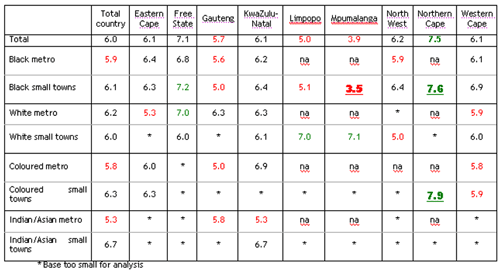Service delivery in urban areas: survey results point to possible flashpoints
For the last 12 months, TNS Research Surveys, South Africa's leading marketing and social insights company, has been tracking how people feel generally about service delivery from their local municipality or local authority in the urban areas of South Africa. Whilst not every municipality of local authority was necessarily visited, it is, nevertheless, possible to obtain a general idea of how people feel about service delivery at a provincial level. This helps to shed light on why people may feel strongly about demarcation issues.
The study was conducted between April 2006 and April 2007. Interviewing was conducted every week except for the two weeks over the festive season and 8 648 adults were interviewed. The study has a margin of error of 2.5% for the percentage results quoted.
Overall, results are not great
People were asked to rate their local municipality or local authority on a five-point scale that ranged from extremely satisfied to extremely dissatisfied. From this, by allocating points to each scale point, it is possible to calculate a score out of 10 that represents people's overall levels of satisfaction.
Looking over the whole country, only 19% are extremely satisfied with their local authority whilst 39% are fairly satisfied. Of concern is that 11% are extremely dissatisfied and 16% are fairly dissatisfied – so that a total of 27% are dissatisfied at some level. The remainder -15% - gave a don't know response. In terms of a points-out-of-10 score, this translates to just 6.0 out of 10. Normally, a score of at least 7.5 out of 10 would be needed to indicate a reasonably satisfactory state of affairs, with no more than 15% giving a dissatisfied rating.
Whilst blacks are more likely to give an extremely satisfied rating (21%) compared with other race groups (between 10% and 13% gave this rating for other race groups), they are also more likely to be extremely dissatisfied (13%, compared with an average of 9% for the other race groups) so that scores out of 10 do not differ greatly except for Indians/Asians who scored their local authorities a 5.6.
Where is the problem the worst?
Again looking initially in overall terms, the top-rated province is Northern Cape (7.5 – 18% are dissatisfied at some level) followed by Free State (7.1 – 19% are dissatisfied)). The worst province is Mpumalanga at 3.9 (35% are extremely dissatisfied and 14% are fairly dissatisfied – a total of 49%), followed by Limpopo at 5.0 where 11% are extremely dissatisfied and 25% are fairly dissatisfied – a total of 36%.
Not to focus only on the negative, the results show that many people are, indeed, fairly or extremely satisfied:
- Gauteng – 55%
- KwaZulu-Natal – 57%
- Western Cape – 63%
- Eastern Cape – 58%
- Free State – 73% (second highest)
- North West – 55%
- Mpumalanga – 32% (lowest)
- Limpopo – 35% (second lowest)
- Northern Cape – 81% (highest)
Given South Africa's history, it is unfortunately necessary to look at results by race. Further, given the provincial demarcation issues, this is also a key variable. Finally, TNS Research Surveys' Everyday Quality of Life Index (EQLi™) has shown that whilst infrastructure is improving in metropolitan areas, the reverse is often the case in small towns as skilled engineers who have maintained this infrastructure have left and been replaced with people not familiar with the often elderly and highly idiosyncratic systems with which they have been entrusted.
The table below dissects the results in terms of these three variables.

Numbers in red are 5.9 and lower; numbers in green are 7.0 and higher. The lowest number is in red, underlined and larger; the two best numbers are in green, underlined and larger.
Of concern is the disparity between whites and blacks in Mpumalanga – a recipe for conflict. The same is true to a lesser extent in Limpopo.
Possible flashpoints
Flashpoints may be identified in places where at least a third of people are dissatisfied. In terms of this criterion, the following areas could become flashpoints:
- Gauteng
- Black metro (33% dissatisfied)
- Black small towns (44% dissatisfied)
- Coloured metro (34% dissatisfied)
- Limpopo
- Black small towns (37% dissatisfied)
- Mpumalanga
- Black small towns (54% dissatisfied)
- North West
- White small towns (38%)
Although the base is too small for precise analysis, there are indications that Whites in the Northern Cape are very dissatisfied.
None of this precludes other areas from becoming flashpoints – when a critical mass of dissatisfied people in a smaller locality arises, trouble can be expected.
Our take-out
Service delivery is a key issue for almost all communities – relatively few show adequate levels of satisfaction. What is of concern is the high number of areas where people are extremely dissatisfied. This puts Government under considerable pressure to address service delivery issues. Whilst this is a repeated mantra of all levels of Government who are very aware of the need, it is clear that people can be expected to become restive if the process is not speeded up.
Technical note
The study was conducted amongst a sample of 8 648 adults (5 941 blacks, 1 207 whites, 1 166 coloureds and 334 Indians/Asians). The study has a margin of error of under 1.5% for the percentage results found for the total sample. The study was conducted by TNS Research Surveys (Pty) Ltd as part of their ongoing research into current social and political issues and was partly funded by TNS Research Surveys. For more details, please contact Neil Higgs, Director: Innovation and Development, on (011) 778-7500 or 082-376-6312. Website: www.tnsresearchsurveys.co.za.


